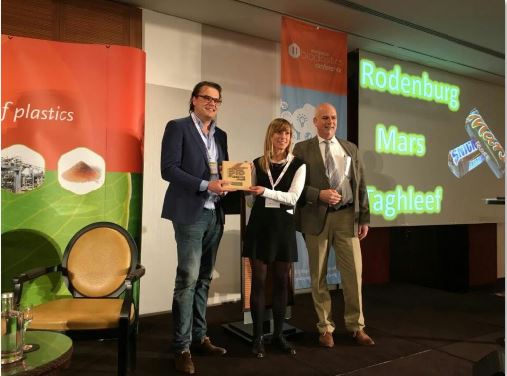The international jury found it an outstanding example of research to develop a complex packaging fulfilling demanding requirements. The prize was awarded to the winning companies on November 29th, 2016 during the 11th European Bioplastics Conference in Berlin, Germany.
Calling it a very ‘cool product’ deserving of the recognition, and an awesome example of team spirit, Michael Thielen, Publisher of bioplastics MAGAZINE presented the 3D- printed trophy produced from wood-filled, brass-filled and copper-filled biobased specialty filaments provided by Venlo-based ColorFabb, to the winners.
Surprised
In an acceptance speech that he kept brief and to the point, Thijs Rodenburg, CEO of Rodenburg Biopolymers, said to be ‘surprised that we won.’ In a single breath, he went on to say: ‘But I think what’s important is that a big brand stood up and used bioplastics. It’s perfect – and it’s a big step!’
The project covered the whole value-chain of packing material processing, ranging from the production of the bioplastic resin (waste starch based Solyanyl® C, Rodenburg) through extrusion and stretching of the plastic films (Ti) to the actual packaging of food products (Mars).
Not only does the material require about 30 % less energy to produce, it also has a carbon footprint that is over 35 % lower than that of traditional packaging materials (PP).
The other finalists 2016 were:
- Far Eastern New Century (Taiwan) with the worlds first 100% Bio-PET polyester shirts
- BASF (Germany) with a new compostable particle foam
- Corbion, Global Bio-Polymers and Maxrich (The Netherlands/Thailand) with a root protection container for rubber trees
- Treeson Spring Water (USA), with a renewable and recyclable water bottle
See also: 2016 Bioplastics Award, and the winner is… (website Bioplastics Magazine)



